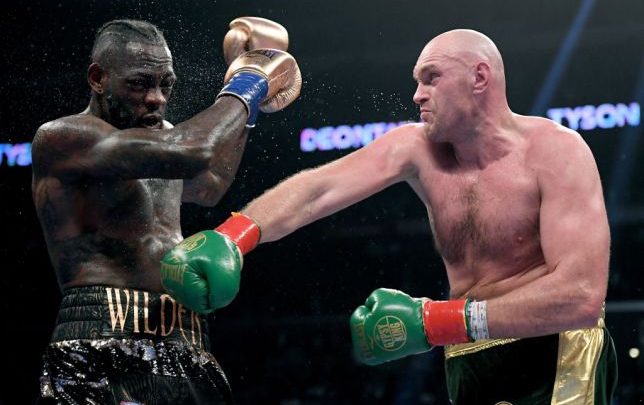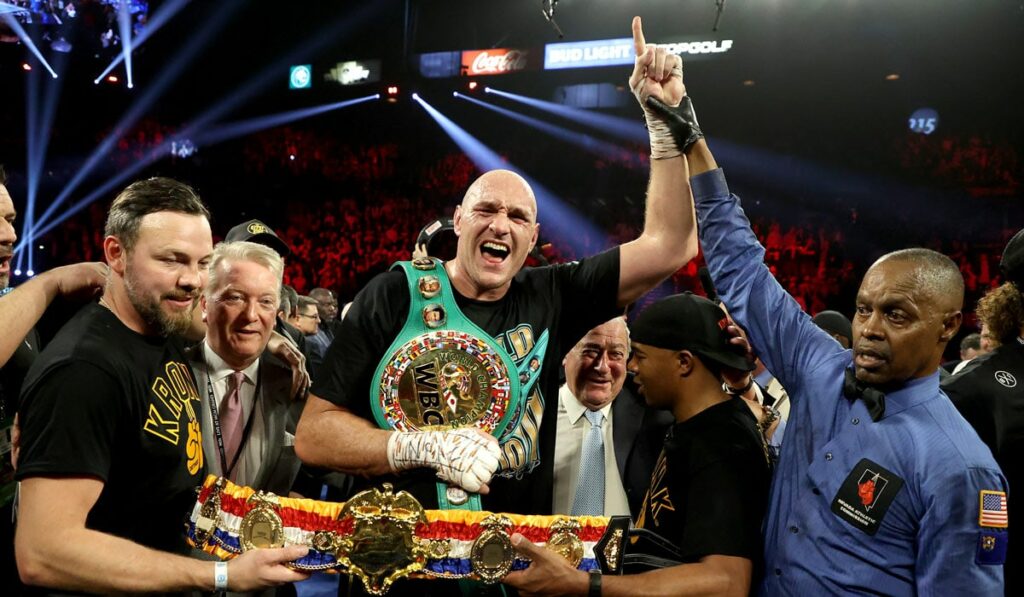Badly overweight and battling severe mental demons, any chances of a successful comeback looked remote for Tyson Fury a couple of years ago. Frank Warren took a punt, of course, and the former undisputed heavyweight champion launched a miraculous and unlikely return. But, after two return fights, the evidence was inconclusive as to whether Fury could recapture former glories.
But then-unbeaten WBC heavyweight champion Deontay Wilder was ringside for the second fight against Francesco Pianeta and clearly liked what he saw. Fury received an unlikely opportunity, which appeared fanciful only a short time previously. Yet it looked too soon; the chances of victory seemed slim for Fury and a matter of ‘when’ for Wilder.
Broadcaster John Rawling was ringside in December 2018 covering the first Fury-Wilder fight for BT Sport. Rawling has been around the sport for many a year and, despite reservations that Fury’s chance had come a little too early, he felt that an upset was very much in the air, despite some telling him he had lost the plot.
“I think everyone thought it was too soon, but life isn’t about things coming at the right time,” Rawling told Boxing Social. “It was a fantastic opportunity for Tyson. I think if Wilder and his people were honest about it, they probably took the fight because they watched his two comeback fights and thought he is a good name on his record and was unlikely to beat Wilder. Even though a lot of people did think it was too soon for Tyson, Wilder is limited, so limited, and anyone who followed the sport closely knew that with Tyson’s boxing ability he had a fantastic chance.”
Winning or losing a fight is often determined by its timing. Matchmaking is a skill that is often overlooked and Frank Warren is a past master of making the right fight at the right time.
“Frank Warren is by nature a gambler and fearless as a businessman,” said Rawling. “He is also somebody who will back his judgement in boxing. He was adamant from the word go that Fury had a great chance of going over there and winning.
“Fury had a gameplan and followed it brilliantly,” he continued. “I wasn’t totally surprised because having seen Wilder in virtually every fight, that was always going to be the story of the fight. Look at his [first] fight with the Cuban Luis Ortiz, he was in all sorts of trouble in that fight. In the first [Fury-Wilder] fight, it was the boxing against the power. It was always a question of could Fury box for 12 rounds and avoid the right hand. In the early rounds, he was way superior and there is an argument he won practically everything other than the two rounds he was put on the floor.”

first encounter, only to be denied by the judges.
The fine start Fury made wasn’t that much of a surprise, but could he maintain his early good work for 36 minutes?
“Fury boxed really well, but he was short of core fitness and maybe belief that he could pull it off,” said Rawling. “But to succeed at the elite level of any sport you have to have full belief in your preparation to go 12 rounds at a fast pace. When you think of the state he was in before his comeback, it is remarkable he got back into a ring at all. [Then trainer] Ben Davison gets praise from some and criticism from others, but there is a very persuasive argument that what he did to get Tyson back in the ring from where he was, he might well have saved his life. Tyson had practically given up on life and Ben deserves huge credit for guiding him to a world title fight so quickly.”
Fury appeared to be coasting to a famous victory in the 12th round at the Staples Center. An earlier knockdown seemed an irrelevance after Fury had got up off the floor to apparently regain control of the fight. But with victory so near, Fury was dropped heavily and seemingly knocked out in the last, and it looked as though his night would end in defeat.
“I thought it was over, I didn’t think there was any way he would get up. I just thought it was a question of him being counted out,” recalled Rawling. “When he got up, it was like a Rocky movie moment. Tyson even won the rest of the round and had Wilder in trouble at the end. It was an astonishing three minutes.”
Having survived that incredible final round, and despite the two knockdowns, most observers thought Wilder would lose his unbeaten record and WBC heavyweight title on the cards. But the night had one final twist as Wilder escaped with a hotly-disputed draw.
“Even with the knockdowns I still had Tyson winning the fight and I will always think he deserved to have won it, ” said Rawling. “Wilder did so little other than those two big moments.”
A rematch was inevitable. We had to wait a while, but in February 2020 the duo shared a ring again, this time in Las Vegas.
But there were fresh concerns. Fury had switched trainers (enlisting Javan ‘SugarHill’ Steward) and weighed in much heavier, promising to mix it with the big-hitting Wilder. He was also badly cut in his previous fight, a supposed warm-up bout with Otto Wallin that proved far tougher than anticipated.
But Rawling was convinced Fury would leave no doubt second time around.
“This time he was a fitter, stronger man who had genuine belief. [Father and ex-pro] John Fury was spot on with the tactics. He knew they would put Wilder on the back foot and intimidate him,” said Rawling. “I remember John saying to me, ‘There are a lot of things I don’t know a lot about, but one thing I do know a lot about is fighting. Nobody has watched more of Deontay Wilder than I have and, trust me, he can’t fight going backwards’.”

before scoring an emphatic seventh round victory.
That belief and confidence in the tactics that Fury undoubtedly had was illustrated in the way the challenger began the rematch. Scoring two knockdowns, Fury dominated from start to finish before scoring a memorable seventh round triumph.
“The first round he just took it to Wilder. I had David Haye at the side of me and he just sat there open-mouthed,” said Rawling. “He said it was a perfect round by Fury. Tyson physically intimidated Wilder, he was terrific that night. Fury looked so much more complete physically than he did in the first fight. In the time since the first fight, he had lived the life as a fighter, and he got his heavyweight man strength back.”
With Wilder triggering the immediate rematch clause, he will receive a trilogy fight with Fury. But on the evidence of their first two encounters, it is extremely difficult to believe Wilder can prevail, especially after the one-sided nature of the rematch:
“You can’t fundamentally change Wilder now. You can’t all of a sudden make him a Sugar Ray Leonard,” said Rawling. “He’s not going to develop a whole new skillset that we haven’t seen before. A lot of it will depend on the mental side. If he goes in there thinking it’s just a payday then he will get beaten again. But psychologically if he gets himself into convincing himself that he can win, then it becomes a much more valid fight.”
There have been many great UK performances on US soil over the years; Lloyd Honeyghan dismantling Don Curry back in 1986, or more recently Carl Frampton dethroning the brilliant Mexican Leo Santa Cruz, but just maybe, what Fury did to Wilder is even more impressive:
“I said at the time, and I still say now, that was one of the most outstanding performances by a British fighter in America,” said Rawling. “There will be a lot of people now saying that Wilder turned out to be nothing, but they were not saying that at the time. A lot of people were saying that Wilder would finish what he started in the last fight and smash Fury. A lot of late money came on Wilder, he hardened as the betting favourite.”

incredible comebacks in sporting history.
The comeback of Fury is a truly inspirational story of a man coming back from the brink, after all the weight gain, substance abuse and mental health problems. For a normal fighter, just getting back into a boxing ring would be viewed as a victory, but Fury has proved he is anything but normal.
“It’s an incredible story and I am so pleased for him that he has conquered his demons. I have known Tyson since he turned pro, and I always rated him and I have always liked him as a man,” said Rawling. “He’s honest, he’s open and charming. I found it so sad that after beating Wladimir Klitschko in 2015 that he didn’t get the praise or the credit he really deserved. After some of the silly things he said, some in the media influenced the public to turn against him.
“But having come back and producing that spellbinding performance in Las Vegas, he showed as a boxer, just how good he is. And, in the meantime, he talked so openly about mental health, being so honest about the problems he had and how he had lost his way, many people have now learned what a good man he is. What he has said and what he has done in the ring, has been an inspiration to so many people.”